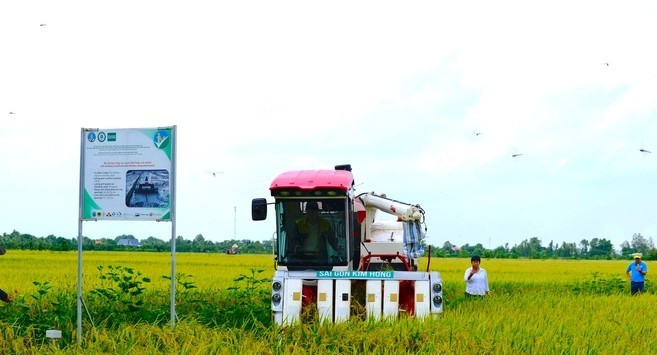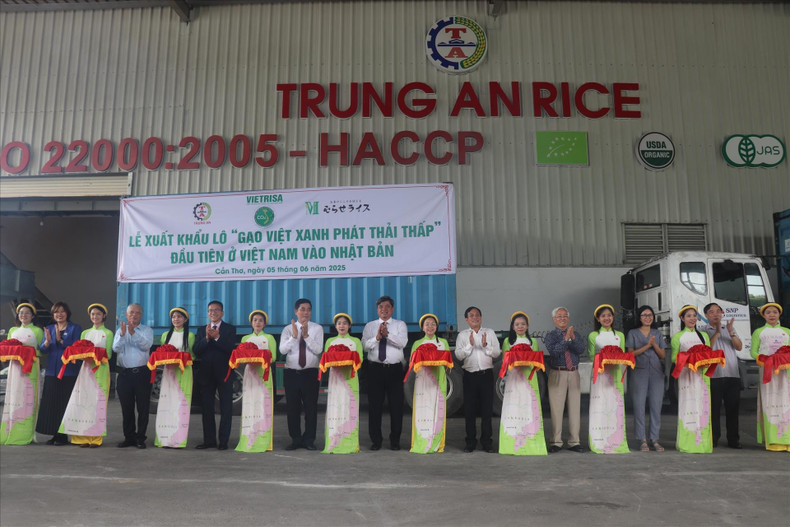Shaping a low-emission rice brand in Viet Nam
On 5 June, the Viet Nam Rice Industry Association (VIETRISA) and Trung An High-Tech Agriculture JSC celebrated the first export shipment of Viet Nam’s green, low-emission rice to Japan. This milestone marks a significant step forward in the nation's agricultural green transition.

Boosting profitability while cutting emissions
The project to cultivate one million hectares of low-emission, high-quality rice in the Mekong Delta (the one-million-hectare rice project) by 2030 is yielding promising results - enhancing economic efficiency while reducing greenhouse gas emissions.
In Dong Thap province, a pilot model was launched during the autumn-winter crop of 2024 in Lang Bien commune, Thap Muoi district. Covering 43.1 hectares with 20 participating households, the initiative demonstrated considerable reductions: less fertiliser usage, one fewer pesticide application, two fewer insecticide treatments, and two fewer fungicide sprays.
Statistics show cost savings of 1.6 million VND per hectare, a production cost reduction of 578 VND per kilogram, an increased profit of 5.3 million VND per hectare, and an average emission reduction of 4.92 tonnes of CO₂ equivalent per hectare.
Expanding to 50 hectares with 24 farmers during the winter-spring crop of 2024-2025, the model achieved fertiliser reductions between 52-87 kg per hectare, three fewer pesticide applications per crop, production cost savings of 2.63 million VND per hectare, cost reductions of 942-971 VND per kilogram, profits rising by 8.6-9 million VND per hectare, and an average emission reduction of 3.91 tonnes of CO₂ equivalent per hectare.

As of March 2025, the project has reached 25.5 hectares, fulfilling 51% of the year's target. The Dong Thap Provincial People’s Committee has now set new objectives—75,000 hectares by 2025 and 161,000 hectares by 2030. The province is also continuing the climate-resilient, sustainable rice value chain project launched in summer-autumn 2024, spanning 14,493 hectares.
Through this project, farmers adopt advanced cultivation technologies that lower greenhouse gas emissions, reduce water pollution, minimise ecosystem contamination, and protect biodiversity and natural pest control mechanisms.
Cao Duc Phat, Chairman of the Board at the International Rice Research Institute (IRRI), explained that the model aims to cut costs, boost yields and value, and ultimately increase farmers' incomes. Furthermore, by reducing pesticide usage, seed rates, and fertiliser dependency, the approach mitigates environmental pollution and greenhouse gas emissions, helping Viet Nam fulfil its international commitments.
Biotechnology: a key solution

According to MSc Le Nang Hung of the Ho Chi Minh City Nature and Environment Protection Association, climate change is accelerating, making green agriculture not a choice, but a necessity.
Sustainable farming must meet current demands without compromising future generations by avoiding exploitative practices. Hung emphasised that sustainable agriculture is not about one plot producing clean food while another is excessively sprayed for market sale.
To effectively adapt to climate change and ensure long-term sustainability, Hung advocates for a stronger application of science and technology, particularly biotechnology. This innovative approach addresses pressing challenges, including the development of salt-tolerant rice varieties - essential as salinity intrusion worsens.
Climate change is accelerating, making green agriculture not a choice, but a necessity.
Meanwhile, Dr Nguyen Van Hung, senior expert and head of the Mechanisation and Post-Harvest Group at IRRI Viet Nam, highlights advancements in digital ecosystems for rice production management.
The RiceMoRe system, developed collaboratively by the Department of Crop Production, the Digital Transformation and Agricultural Statistics Centre, and IRRI, automates data aggregation from farm to national levels, improving reporting quality. Notably, it also stores and processes greenhouse gas emission data linked to rice cultivation.
Dr Hung affirmed that digital technologies like RiceMoRe lay the foundation for Viet Nam’s agriculture to achieve transparency, enhance product value, and better meet domestic and international market demands by 2028.
Nguyen Thi Thu Huong, Deputy Director of the Department of Crop Production and Plant Protection at the Ministry of Agriculture and Environment, stressed that a clear understanding of sustainable farming benefits fosters farmers' active, long-term participation. Scaling the model requires well-defined policies and strategic solutions that strengthen the connections between farmers, businesses, and markets.
Viet Nam’s rice sector must strive to produce responsible, high-value products that serve consumers while securing the industry's future.
Viet Nam’s rice sector must strive to produce responsible, high-value products that serve consumers while securing the industry's future. Establishing a robust low-emission rice brand can unlock new markets, increase product value, and elevate Viet Nam’s global standing.
Pilot results from IRRI suggest that the one-million-hectare rice project is on track to meet its objectives, with promising expansion across the Mekong Delta and nationwide. This initiative holds the potential to improve livelihoods and incomes for rice farmers, ensure a cleaner environment, and contribute meaningfully to global climate change mitigation.








